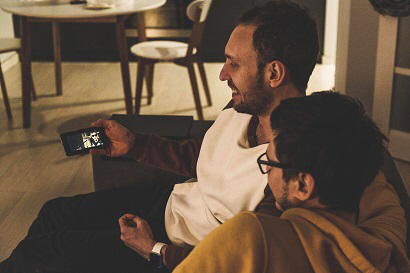By Cailin Crosby

Emotional pain is an inevitable part of life. No matter how many coping skills we have in our tool box, there will be unexpected moments in life where no amount of preparation or coping feel helpful. When we are overwhelmed or in distress, it can be hard to imagine shifting our focus to anything other than what’s causing us the distress.
In those moments, it may be difficult to picture how you could ever start to get out of it. This makes sense, because research has shown that overwhelming anxiety and stress can disrupt our decision-making processes and make it challenging for us to regulate our emotions. This is where the use of distraction can be a positive, adaptive way to help us cope.
What makes distraction different from avoidance is intention. Distractions are purposeful and time-limited, with the goal of helping you cope in the moment so that you can return to a place of calm. Engaging in a positive distraction is an active choice that requires acceptance of the present moment and the intentional act of doing something about it. Avoidance, on the other hand, is about not doing something. Avoidance is passive and usually involves denying, versus accepting, the current reality.
Some distractions and avoidance behaviours may look pretty similar on the surface; if you’re uncertain which one you’re engaging in, ask yourself about intention: “Am I doing this because I’m putting something off and pretending it doesn’t exist?” Or “Am I choosing to do something different now with the goal of feeling more calm so that I can come back to it in a productive and helpful way later?”
Calming our Body’s Alarm System
When we are confronted with acute anxiety and stress our brain interprets this as a threat and responds by releasing stress hormones throughout the body, activating our sympathetic nervous system. When our sympathetic nervous system is activated we undergo physiological changes, such as an increased heart rate, elevated blood pressure, rapid breathing, muscle tension, and a surge of energy.

When we are faced with a life-threatening danger, this built-in alarm system can be key to our survival enabling us to react quickly. However, our brain does not discriminate between life-threatening dangers and high levels of emotional arousal; meaning, the body responds the same way whether we are escaping a motor vehicle collision or having an argument with a partner. In order to counteract this process, we need to activate our parasympathetic nervous system. If the sympathetic nervous system is like the body’s gas pedal, think of the parasympathetic nervous system like the brakes. The use of positive distractions is one way to help initiate the parasympathetic nervous system when you’re in a state of distress.
Changing up your environment or temperature, engaging your body and your five senses, and reaching out to your support network can all be useful distractions to help activate your parasympathetic nervous system.
Experience a temperature change:
Experiencing a change in temperature can help ground us in the present moment by engaging our senses and bringing our awareness back to our bodies.
- Run your hands under cold water or splash some cool water on your face
- Hold an ice cube in your palm or run it along your forehead and cheeks
- Step outside into the fresh, cold air
Exercise:
Engaging in brief, high intensity exercise can help use up some of that excess energy and releases endorphins which decrease our perception of pain and increase positive feelings. Exercise can also help to restore deeper breathing and relieve muscle tension.
- Take a brisk walk
- Go for a short run
- Dance
- Do jumping jacks
- Practice yoga
Do something hands-on:

This could be anything tactile that brings you comfort! Focusing on the feel, textures, colours, or smells of what you’re working with will help ground you in the present moment.
- Draw
- Paint
- Knit
- Play music
- Write
- Fold laundry
- Do the dishes
Reach out to social supports:
Connect with others who care about you. Research has consistently demonstrated that the presence, or even just the reminder, of social supports can reduce psychological and physiological responses to threats.

- Call or text a friend or family member
- Spend time with your roommates, partner or pets (yes! Pets absolutely count as social supports)
- Write a letter to send to someone
- Play a co-operative board game or video game that allows you to connect and engage with friends in real life or online.
“Acceptance of reality is not equivalent to approval of reality”

Tolerating distress necessitates accepting our current reality. Accepting our reality is a skill that we can develop through practicing mindfulness. In my first blog on mindfulness I explained that one of the goals of mindfulness is to be able to live fully in the present moment without becoming overwhelmed or reactive to what is happening around us. Part of cultivating this skill is being able to adopt a stance of non-judgmental acceptance of the present moment.
On this topic, Marsha Linehan, creator of Dialectical Behaviour Therapy (DBT), reminds us that “although the stance advocated here is a non-judgmental one, this should not be understood to mean that it is one of approval. It is especially important that this distinction be made clear: acceptance of reality is not equivalent to approval of reality.” We can accept our reality without placing judgment on it or approving of it.
The goal of mindful acceptance is not to force yourself to sit in a highly distressed state. It is about developing the self-awareness to recognize when you need to take a step back and having the self-compassion to do so.
Want to talk more about coping strategies?
